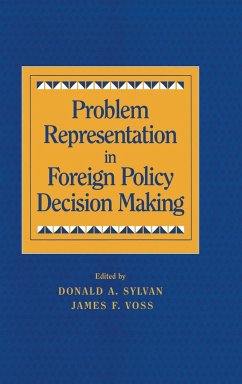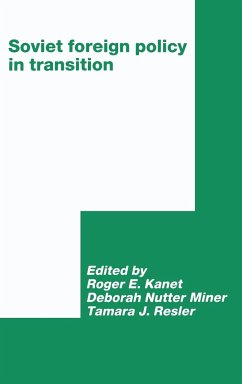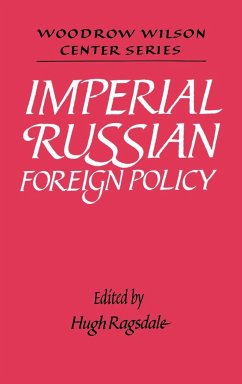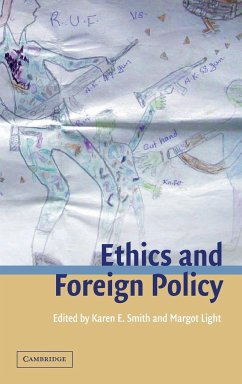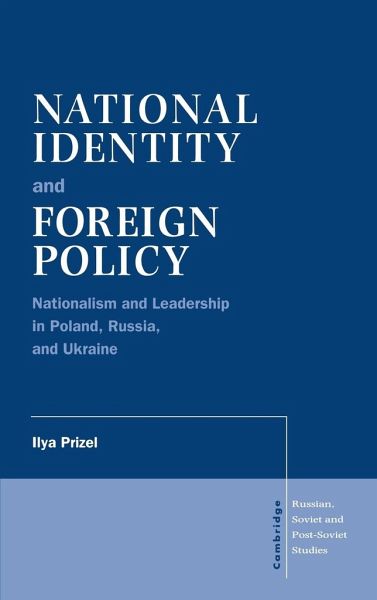
National Identity and Foreign Policy
Nationalism and Leadership in Poland, Russia and Ukraine

PAYBACK Punkte
91 °P sammeln!
This book is based on the premise that the foreign policy of any country is heavily influenced by a society's evolving notions of itself. Applying his analysis to Russia, Poland, and Ukraine, the author argues that national identity is an ever-changing concept, influenced by internal and external events, and by the manipulation of a polity's collective memory. The interaction of the narrative of a society and its foreign policy is therefore paramount. This is especially the case in East-Central Europe, where political institutions are weak, and social coherence remains subject to the vagaries ...
This book is based on the premise that the foreign policy of any country is heavily influenced by a society's evolving notions of itself. Applying his analysis to Russia, Poland, and Ukraine, the author argues that national identity is an ever-changing concept, influenced by internal and external events, and by the manipulation of a polity's collective memory. The interaction of the narrative of a society and its foreign policy is therefore paramount. This is especially the case in East-Central Europe, where political institutions are weak, and social coherence remains subject to the vagaries of the concept of nationhood. Ilya Prizel's study will be of interest to students of nationalism, as well as of foreign policy and politics in East-Central Europe.
Table of contents:
Introduction: a statement of the arguments; 1. National identity and foreign policy: a dialectical relationship; 2. Polish identity 1795-1944: from romanticism to positivism to ethno-nationalism; 3. Poland after World War II: native conservatism and the return to Central Europe; 4. Polish foreign policy in perspective: a new encounter with positivism; 5. Russia's national identity and the accursed question: a strong state and a weak society; 6. Russian identity and the Soviet period; 7. Russia's foreign policy reconsidered; 8. Ukraine: the ambivalent identity of a submerged nation, 1654-1945; 9. Post-World War II Ukraine: birth pangs of a modern identity; 10. Foreign policy as a means of nation building.
This book argues that the foreign policy of any country is heavily influenced by national identity. This is especially the case in East-Central Europe where political institutions are weak, and social coherence remains subject to the vagaries of the concept of nationhood. Ilya Prizel's study examines the history and politics of Russia, Poland and Ukraine, and will be of interest to students of nationalism, as well as foreign policy and politics in East-Central Europe.
Examining the recent history of Poland, Russia and Ukraine, this book examines how national identity affects foreign policy decisions.
Table of contents:
Introduction: a statement of the arguments; 1. National identity and foreign policy: a dialectical relationship; 2. Polish identity 1795-1944: from romanticism to positivism to ethno-nationalism; 3. Poland after World War II: native conservatism and the return to Central Europe; 4. Polish foreign policy in perspective: a new encounter with positivism; 5. Russia's national identity and the accursed question: a strong state and a weak society; 6. Russian identity and the Soviet period; 7. Russia's foreign policy reconsidered; 8. Ukraine: the ambivalent identity of a submerged nation, 1654-1945; 9. Post-World War II Ukraine: birth pangs of a modern identity; 10. Foreign policy as a means of nation building.
This book argues that the foreign policy of any country is heavily influenced by national identity. This is especially the case in East-Central Europe where political institutions are weak, and social coherence remains subject to the vagaries of the concept of nationhood. Ilya Prizel's study examines the history and politics of Russia, Poland and Ukraine, and will be of interest to students of nationalism, as well as foreign policy and politics in East-Central Europe.
Examining the recent history of Poland, Russia and Ukraine, this book examines how national identity affects foreign policy decisions.




